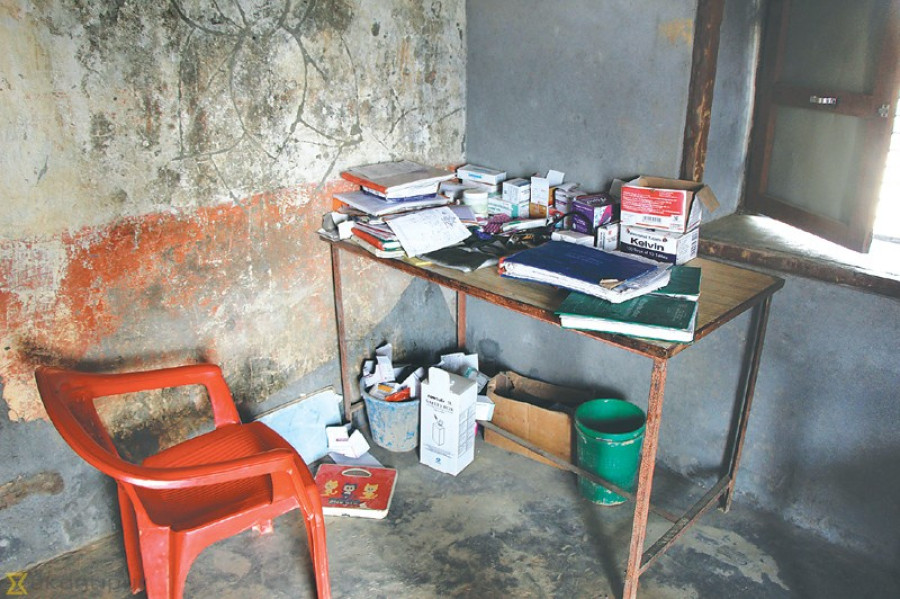National
Failure to strengthen local health facilities forces patients seek costly treatment in capital
Three weeks ago, Keshav Devkota, from Kalika Rural Municipality of Rasuwa, was rushed to Trishuli District Hospital, of adjoining district Nuwakot, after he ran a high fever.
Arjun Poudel
Three weeks ago, Keshav Devkota, from Kalika Rural Municipality of Rasuwa, was rushed to Trishuli District Hospital, of adjoining district Nuwakot, after he ran a high fever.
Doctors there referred the 43-year-old to the Tribhuvan University Teaching Hospital in Kathmandu, saying the hospital neither had the infrastructure nor the manpower to diagnose the ailment and provide proper care.
Devkota’s relatives rushed him to Teaching Hospital, where they reached almost at midnight. At the hospital, as there was no empty bed available, Devkota was kept in the emergency ward for the next 14 hours.
“The hospital staff—including doctors—kept telling us to take him to a private hospital,” his brother Tika told the Post. “We told them about our financial conditions and pleaded to arrange a bed in the hospital.”
The hospital transferred the patient to the ward only the next evening—after more than 24 hours.
The Tribhuvan University Teaching Hospital is one of the only national referral hospitals in the country that provides tertiary care. Patients from across the country reach the hospital for quality care.
Every day over 2,000 patients from across the country seek outpatient department care from the hospital, and over 200 patients seek emergency care in the hospital. Due to a lack of beds, the hospital has been providing emergency care for patients keeping up to four patients in a single bed.
Nepal has a referral type of health care system, which means patients first go to a health post for treatment. The health post refers patients to primary health care centres, and then the centres refer them to district hospitals. District hospitals refer them to zonal hospitals, which then send them to regional hospitals until they reach the central hospital.
Devkota complained that he would not have to come to Kathmandu if the district hospital were well equipped and could provided treatment.
“Patients like us cannot afford private health facilities,” Devkota said. “Authorities concerned should take initiatives to address the plight of patients like us.”
Dr Prem Krishna Khadka, director at Teaching Hospital, said that his hospital cannot provide care to all patients seeking treatment. “We cannot take in all patients. Keeping patients in a single bed is not our choice but compulsion.” He said that it was imperative that the hospital provided them with treatment in any way possible.
He conceded that patients have to struggle to get beds and have to wait for months to schedule simple surgeries like gallbladder and prostate among others.
The case is similar at Bir Hospital and other government hospitals in Kathmandu.
Dr Madan Prasad Upadhyay, former Dean of the Institute of Medicine, said the referral health system has not been working, and patients are being forced to come to the Capital even for minor treatment.
"The government first failed to send qualified medical representatives on the lower level, then it failed to equip those centers with required infrastructure and technical manpower, then it failed to provide the essential drugs,” said Dr Upadhyay. He said that local health facilities should be equipped with required manpower and infrastructure to end the woes of patients.
“Who wants to spend a lot in treatment at private hospitals?” Dr Arjun Karki, former Vice Chancellor of Patan Academy of Health Sciences, said, adding that patients would prefer government services if it were effective.
He said that big crowds in government health facilities and the harsh behaviour of hospital staff forces patients to seek private care. Government health facilities throughout the country also lack doctors and other technical manpower.
The World Health Organization (WHO) says that 42 doctors are needed for every 10,000 people, but in Nepal only 23 doctors do the job—in both government and private health facilities—according to Mahendra Prasad Shrestha, Chief of Health Coordination Division at the MoHP.
Shrestha, who is also the spokesperson of the Health Ministry, said that the government was working to strengthen local health facilities.
“We are working to ensure basic health care services, including general surgery in district hospitals and tertiary care in provincial hospitals,” said Shrestha, adding that the central hospital will only provide super specialty services.
To ensure the said services are available in local levels, the government has to ensure manpower and infrastructures, which is not possible in near future. Shrestha said that entire Sudurpaschim Pradesh (Province-7) lacked psychiatric doctor and anesthetics, due to which patients have to come to Kathmandu for psychiatric consultation and minor surgery.
Shrestha said that all three tiers of government should work to lessen the plight of people and ensure basic health care services in local level




 19.67°C Kathmandu
19.67°C Kathmandu















